American Express (AmEx) continues to thrive in a challenging economic landscape, demonstrating an ability to not only sustain but grow its affluent customer base. In the face of rising inflation and ongoing worries regarding trade tariffs, which have sent ripples through the economy, AmEx has reported a 6% increase in billed business for the first quarter. This growth is noteworthy, especially when considering the backdrop of economic shakiness. The significant role younger demographics play in driving this growth—particularly Millennials and Gen Z—reveals a seismic shift in consumer habits, raising questions about how businesses cater to these increasingly influential customer segments.
Younger Consumers: The New Frontier of Spending
The statistics are telling: younger cardholders increased their spending by an impressive 14% in the first quarter, contrasting sharply with the more cautious attitudes exhibited by Gen X and Baby Boomers, who registered only 5% and 1% increases, respectively. This discrepancy is not merely a numerical detail; it emphasizes a broader cultural transformation. Young consumers are not just facing the economic realities of today; they are redefining what it means to spend and invest in experiences. They are moving away from traditional save-first models and embracing credit as a means to enhance their quality of life. It raises an intriguing question: are we witnessing the birth of a consumer culture that prioritizes immediate gratification over long-term financial stability?
Resilience Amidst Tariff Turmoil
Despite the specter of tariffs looming large over the financial landscape, AmEx’s growth illustrates a resilience that many companies in the retail and airline sectors are struggling to maintain. While Synchrony Financial has indicated a slowdown in consumer spending, suggesting that not all credit providers share this fortune, AmEx’s affluent clientele can be viewed as a stabilizing fortress against market uncertainties. CFO Christophe Le Caillec’s assertion that there is still “stability and strength” rings true in this context. It reflects a reassuring notion: perhaps the wealthy remain less tethered to economic pressures compared to their less affluent counterparts.
The Importance of Experience-Based Spending
A particularly telling segment of spending is in restaurants, which saw an 8% increase—a remarkable feat given the challenges in other categories. This trend towards experiential spending underscores a potential underlying philosophy prevalent among younger consumers: life is fleeting, and experiences hold far more value than material possessions. Dining out, thus, becomes a protest against frugality during turbulent times. If this trend is sustained, it indicates a cultural movement that values quality of life in the face of uncertainty—a refreshing antidote to a purely consumer-driven economy.
Airline Industry: A Cautionary Tale
While American Express basks in its robust growth, not all areas are shining. Airline transactions grew a mere 3%, which is a stark decline from the previous quarter’s 13%. This discrepancy should not be overlooked; it reveals the brewing storm within an industry that relies heavily on discretionary spending. As tariffs threaten to increase operational costs, consumer hesitance in air travel becomes understandable. The uncertainty has cast a shadow over what was previously a thriving sector, reinforcing the notion that when affluence declines, so too will spending on luxury services like travel.
The sharp contrasts within AmEx’s financial performance highlight the diverging paths of consumer behaviors. It’s an intricate dance between economic pressures and evolving spending philosophies—a landscape where businesses must pivot fast, lest they be left behind in an age marked by rapid change and uncertainty.

